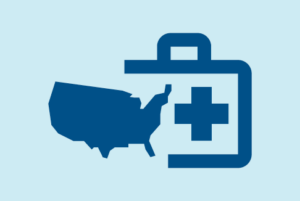In June 2022, the Legislature and governor approved a $308 billion budget for the state fiscal year spanning from July 2022 through June 2023. In late August, the Legislature passed and the governor is expected to approve revisions to the 2022-23 Budget Act, which generally redirect, build upon, or provide statutory parameters around actions previously taken.
Below is a summary of key health care-related actions in the 2022-23 budget package.
Health Care Workforce
- Health Care Workforce Investments. The budget commits $1.5 billion over the next three years to health care workforce development programs. This funding will support programs dedicated to various professions, including nursing ($357 million), community health workers ($281 million), behavioral health ($226 million), primary care ($45 million), reproductive health ($40 million), and others. While many different state departments will play a role in administering these programs, the Department of Health Care Access and Information (HCAI) will serve as the administering agency for most of the programs. Guidance on how to access these funds will be released in the coming months by the administering departments. A breakdown of the various workforce investments can be found in this document.
- Hospital and Nursing Home Worker Retention Pay. The budget provides nearly $1.1 billion in state funding to hospitals and nursing homes to make retention payments to their workers. Workers will be eligible for payments of up to $1,500 from the state, with state support varying based on hospital and nursing homes making qualifying matching payments to their workers.
- Clinic Workforce Stabilization Retention Payments. The final version of the budget includes $70 million to qualified clinics to make payments of up to $1,000 to each of their workers. Unlike the hospital and nursing home worker retention payments, no employer match is required for workers to be eligible for the maximum payment. Qualified clinics include federally qualified health centers (FQHCs) and look-alikes, rural health clinics, free clinics, intermittent clinics, and Indian Health Centers.
Coverage Expansions
- Comprehensive Medi-Cal Coverage for All Undocumented Immigrants. The budget approves the expansion of full-scope Medi-Cal coverage to otherwise eligible undocumented immigrants ages 26-49, the last remaining age group currently ineligible for full-scope coverage. Implementation is slated to occur in January 2024. Over 700,000 Californians are expected to gain full-scope coverage under the expansion, with total costs projected to eventually reach $2.6 billion annually. With this and other Medi-Cal changes, nearly all Medi-Cal beneficiaries are expected to be enrolled in Medi-Cal managed care.
- Continuous Medi-Cal Eligibility for Children Under Age 5. Contingent upon a future determination by the Department of Finance that state funding can support this change, Medi-Cal eligibility redeterminations for children under age 5 will be prohibited — except in limited circumstances, such as when a child moves out of state, becomes deceased, or voluntarily is disenrolled by a family member. This policy would take effect in January 2025.
Behavioral Health
- The Community Assistance, Recovery, and Empowerment (CARE) Act. The budget funds and companion legislation authorizes the CARE Act, otherwise known as CARE Court, a framework for the delivery of behavioral health services for individuals with the most serious behavioral health needs, including individuals who are homeless and/or at risk of incarceration. The CARE process is intended to serve as a diversion pathway from conservatorship. The October 2023 implementation will initially be limited to a cohort of counties — Glenn, Orange, Riverside, San Diego, San Francisco, Stanislaus, and Tuolumne. The budget allocates a one-time $26 million for the first cohort of counties, and $31 million for all counties to plan and prepare for statewide implementation. An additional $31 million is provided to the judicial branch, the Department of Health Care Services, and California Health and Human Services Agency to support implementation.
- Behavioral Health Bridge Housing. The budget provides $1.5 billion over two years for cities and counties to provide bridge housing, such as in board and care facilities and through the acquisition of tiny homes, as well as behavioral health services for individuals experiencing homelessness. Individuals with behavioral health needs are eligible for this support, with CARE Court participants being prioritized.
- Children’s Behavioral Health Package. The budget provides $290 million over three years to address urgent youth mental health issues. This funding will support school-based peer mental health services, the development of resources for parents to support their children’s mental health, a youth suicide reporting and crisis response pilot program, the development of digital supports for remote mental health assessment and intervention, and a program to attract high school students considering entering the behavioral health profession. This package builds upon the $4.4 billion investment in 2021 in the Children and Youth Behavioral Health Initiative.
- Mobile Crisis Intervention as a Medi-Cal Benefit. The budget provides $108 million to counties to implement a new statewide mobile crisis intervention Medi-Cal benefit starting in January 2023. The benefit will build on existing crisis intervention services delivered by counties.
- Los Angeles County Incompetency-to-Stand-Trial Services and Supports. The budget includes $100 million from the General Fund for Los Angeles County to support and expand access to treatment for moderately to severely mentally ill, justice-involved individuals, including through the construction, acquisition, or rehabilitation of a mental health care treatment facility or facilities.
- Opioid Package. The budget includes a $42 million opioid package that will support substance use disorder workforce development, naloxone distribution, and outreach and awareness campaigns.
- 9-8-8 Suicide Prevention Lifeline. The budget provides $8 million to support the initial implementation of the 9-8-8 National Suicide Prevention Lifeline that launched in July 2022. Legislation currently before the governor would authorize and provide ongoing funding for call centers to operate the lifeline.
Health Care Affordability
- Office of Health Care Affordability (OHCA). The budget authorizes and funds the OHCA, whose goals are to improve health care affordability while promoting quality, equity, and workforce stability. Its key responsibilities are to increase transparency on costs, develop cost targets for the health care industry, enforce compliance with the cost targets, monitor and review market transactions, and establish new standards, such as for quality and equity. The OHCA is housed within HCAI. Full implementation will occur over several years. A recent CHA webinar provides a deep dive on the OHCA.
- Reduction of Medi-Cal Premiums to $0. Historically, Medi-Cal beneficiaries with incomes above certain levels were required to pay premiums, typically of around $13 per person per month. The budget reduces these premiums to $0, effective July 2022.
- Reduction of Medi-Cal Cost-Sharing Requirements for Affected Seniors and Persons with Disabilities. Contingent upon a future determination by the Department of Finance that state funding can support this change, the state would reduce cost-sharing requirements for Medi-Cal beneficiaries with incomes too high for them to qualify for cost-free Medi-Cal. This policy would take effect in January 2025.
- CalRx Biosimilar Initiative. The budget provides $101 million in one-time funding to develop low-cost insulin products to support the manufacturing and distribution of state-branded generic insulin, as well as the construction of a California-based manufacturing facility.
Other Medi-Cal Policies
- Permanent Extension of Certain Medi-Cal COVID-19 Policies. The budget makes permanent several Medi-Cal policies that address the COVID-19 pandemic. These include expanding hospital presumptive eligibility for seniors and persons with disabilities, allowing separate billing for COVID-19 vaccine administration at FQHCs, increasing oxygen and respiratory durable medical equipment rates to 100% of Medicare rates, and maintaining the 10% rate increase for intermediate care facilities for the developmentally disabled.
- Equity and Practice Transformation Payments. The budget approves a multi-year $700 million initiative to support clinical infrastructure improvements aimed at improving children’s preventive services, maternal and adolescent depression screening, follow-up after behavioral health-related emergency department visits, and closing racial and ethnic disparities on measures of preventive services and Cesarean rates. Incentive payments to providers will be made through Medi-Cal managed care plans. Details of the initiative remain under development.
- Forgiveness of Independent Pharmacy Recoupments. The budget provides $143 million over two years to forgive retroactive recoupments from independent pharmacies owed due to a change in Medi-Cal’s methodology for pharmacy reimbursement. Independent pharmacies include those for which no person or entity owns more than 74 pharmacies in California. This action will coincide with the end of related litigation between pharmacies and the state.
- Extension of Nursing Facility Financing Methodology. The state’s methodology for reimbursing freestanding nursing facilities for Medi-Cal stays was set to expire in 2022. The budget extends and makes changes to the Medi-Cal reimbursement methodology for freestanding nursing facilities, effective January 2023 through December 2026. The updated methodology provides a 4% average annual rate increase, extends the 10% COVID-19 rate increase through 2023, establishes a new workforce and quality incentive program, and authorizes additional rate increases for facilities that meet new workforce standards.
- Medi-Cal FQHC Alternative Payment Methodology. The budget authorizes the implementation of a voluntary alternative payment methodology for FQHCs to encourage a move away from volume-based reimbursement. This program will be implemented no sooner than January 2024.
- Elimination of Certain Medi-Cal Provider Payment Reductions. The budget allocates $20 million to eliminate certain Medi-Cal fee-for-service provider payment reductions that have been in place since the Great Recession, beginning July 2022. These include, but are not limited to, rates for the following providers: nurses, alternative birthing centers, oxygen and respiratory durable medical equipment providers, portable imaging services, emergency medical air transportation, surgical clinics, and outpatient heroin detoxification services.
- Elimination of End-of-Year Delay in Fee-for-Service Payment Processing. Since 2007, the state has delayed Medi-Cal fee-for-service payments from the last two weeks of the state fiscal year to the beginning of the following fiscal year, a budget maneuver that resulted in one-time state savings. The 2022-23 budget eliminates this delay in payments beginning in June 2023 at a one-time cost of $796 million, with the goal of accelerating payments to providers.
Other Health
- No Community Benefits Proposal. As part of the budget, the governor proposed requiring nonprofit hospitals to allocate 25% of their community benefits spending to community-based organizations to address the social determinants of health. The final budget does not include this proposal.
- COVID-19 Supplemental Sick Leave Extension. The budget extends the deadline for employees to use their existing COVID-19 supplemental paid sick leave from Sept. 30 to Dec. 31, 2022. The budget also provides funding for nonprofit employers with fewer than 50 employees to offset some of the costs of this sick leave. Additionally, it allows employers to require employees to take a third test, at no cost to the employee and within 24 hours, if an employee’s second test is positive after the initial five-day isolation period. Finally, it allows employers to reject supplemental paid sick leave beyond the initial 40 hours if an employee refuses to take these tests.
- Reproductive Health Package. The budget includes a $225 million package of investments to promote access to reproductive health care, including grants for reproductive health care providers who provide uncompensated care to uninsured and underinsured individuals, supplemental payments for non-hospital community clinics that provide abortion services, investments in the reproductive health care workforce, funding for physical and electronic infrastructure improvements at facilities that provide related services, coverage of the human papillomavirus vaccine within the Family Planning, Access, Care and Treatment Program, the backfill of lost Title X family planning funding, and others.
- Health Information Exchange (HIE) Grants. The budget allocates $50 million over two years to support HIE adoption, as required under the California Data Exchange Framework. The grants will support the provision of technical assistance, provider onboarding to HIEs, an incentive program to encourage the adoption of electronic health record systems compatible with HIE, and other activities.
- Infectious Disease Testing and Navigation Service Grants. The budget allocates $15 million to the California Department of Public Health to administer a one-time grant program to support testing and navigation services for infectious diseases, including hepatitis C, HIV, and syphilis. These grants are targeted toward hospital emergency departments.
- Climate Change and Health. The budget includes $35 million to support local health jurisdiction planning, including the development of climate and health resiliency plans, and to track climate-sensitive diseases and health impacts. The California Department of Public Health will administer this funding.


